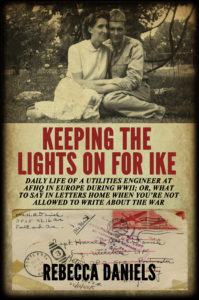
Description Keeping the Lights On for Ike by Rebecca Daniels
Daily Life of a Utilities Engineer at AFHQ in Europe During WWII; or, What to Say in Letters Home When You're Not Allowed to Write about the War Most people don’t realize that during the war in Europe in the 1940s, it took an average of six support soldiers to make the work of four combat soldiers possible. Most of what’s available in the literature tends toward combat narratives, and yet the support soldiers had complex and unique experiences as well. This book is based on personal correspondence, and it is primarily a memoir that creates a picture of the day-to-day realities of an individual soldier told in his own words [as much as he could tell under the wartime rules of censorship, that is] as well as giving insight into what it was actually like to be an American soldier during WWII. It explores the experiences of a non-combat Army utilities engineer working in a combat zone during the war in Europe and takes the protagonist from basic training through various overseas assignments—in this case to England, North Africa, and Italy as a support soldier under Eisenhower and his successors at Allied Force Headquarters. It also includes some reflections about his life after returning to Oregon when the war was over. The soldier involved is Captain Harold Alec Daniels [OSU, Class of 1939, ROTC] and most of the letters were written to his wife, Mary Daniels [attended U of O in the late 1930s]. They are the author's parents, and she inherited the letter collection, photos, and all other primary source materials after her mother’s death in 2006.Praise Keeping the Lights On for Ike by Rebecca Daniels
“The book moves swiftly along, while at the same time capturing the frustration of their prolonged separation. The historical timeline provides just the right bit of historical context to these war years behind at the tail of the army. This is not the typical WWII combat book.”- The Montague ReporterKeeping the Lights On for Ike by Rebecca Daniels
Review by Sage Nor
I absolutely loved this memoir about love and war and I think that if you're reading this, you will too. A little known fact about World War II is that for every four soldiers that were actually fighting on the front lines, there were another six full support troops made up of men with more specialized training to keep up the infrastructure and administration that war demands. It's not something we often think about, especially some eighty years later, when most of these things work with more automation. But back in 1941, just after the United States began fighting the war, many things still had to be done by human beings who were brought there for that purpose.
Rebecca Daniels writes about just such a person. Before he was drafted into the war, her father, Alec was an electrical engineer and a member of the ROTC. Because of this, he was sent to maintain the electrical systems on the war front and was kept under a strict code of silence as to his whereabouts. Though he could not talk much about what he did in his day-to-day work, Alec still wrote home frequently to his new wife, Mary. Mary kept these letters and cards for sixty years until her death and it is around these love letters that Daniels crafts her memoir.
This is a beautiful, fascinating and heart-pounding story and one that should not be missed. It's incredible to think that these were real people living under such extraordinary circumstances, but Daniels makes it seem as if you are hearing the story first hand as you read.
My biggest take away from this memoir is the amount of background work that went into the war effort that I had never really considered before. Alec seemed like a very intelligent man and his daughter carefully relates the details of his work, undiluted in a way that he was never allowed to during the war.
Excerpt from Chapter 13:
Return to Naples and Caserta (July—September 1943)
It was in the summer of 1944 that he started to talk about the local swimming pool that was just across from where he worked, a pool he described as so cold that he jumped right out again the first time he went in, but he found it cooled him down for quite a while afterwards and made him think he might like to live somewhere that he could have a pool in his back yard, saying “it’s a lot of fun when the weather is hot, and it makes me feel a lot better than I have for a long time. It takes that tired feeling away” [September 2, 1944]. This was definitely not your average local swimming pool, though. While he never identified the pool by name, his photos included several images of soldiers swimming in pools and fountains on the grounds of Caserta palace, so his swimming pool was actually a huge and elegant water feature, designed by Luigi Vanvitelli as an integral part of the palace gardens, combining the tradition of the Italian Renaissance Garden with elements from the gardens at Versailles. All the pools, streams, and fountains at Caserta were fed by the Carolino Aqueduct, which was originally built in the mid 18th century to serve the water needs of not only the palace but also the city of Naples and all the farms in the surrounding area. The water originated from springs in the hills above Naples and the conduits were mostly underground, which would account for the chilly water Alec noticed. Alec’s swimming pool would have been the Peschiera Grande [literally, the large fish pond], a pool of water more than 1,500 feet long with the Fountain of the Three Dolphins at one end, from whose mouth came the mountain spring-fed water from the aqueduct. The network of pools and fountains also included a miniature mock castle and were originally used for naval war games for the young prince Ferdinand IV of the Bourbon dynasty. In fact, the fountains and waterways, complete with statuary on all levels, extended almost two miles up the natural hillside surrounding the palace gardens, and it would seem that centuries after those 18th century princely war games, they continued to provide recreational opportunities for many Allied soldiers awaiting their next real war assignments.
In early September Alec reported that, “Things have been moving so fast that they have started interrupting the radio programs to give us the latest flashes. Just a few moments ago they said we had crossed the Belgium border and we are almost to the German border. It sounds good for you and me, Mary; boy will I enjoy getting you in my arms after this is all over” [September 2, 1944]. In fact, things were progressing very quickly for the Allies in the Mediterranean and southern Europe. In the Mediterranean, the US Fifth Army launched an assault on September 8 against the Gothic Line north of Florence, Field Marshall Albert Kesselring’s last major line of Nazi defense in Italy. The British Eighth Army took Monte Altuzzo on September 17, San Marino on the nineteenth, Marradi on the twenty-fourth, and, as Julius Caesar had done in 49 BC, reaching the proverbial “point of no return” as they crossed the Rubicon in northeastern Italy on August 26. On September 2, Germans began to evacuate the Aegean Islands, on the twelfth they evacuated Rhodes and other Greek islands in the eastern Mediterranean, on the twenty-first they evacuated the Peloponnesian peninsula, and on September 27 they evacuated western Greece entirely.
In France, Patton’s troops took Verdun and the Canadians liberated Dieppe on September 1. On the second, the Allies crossed into Belgium, and on the third the British Second Army liberated Brussels. On September 9, General de Gaulle formed a provisional French government that included communists. More victories in France include LeHavre on the twelfth and Calais on the thirtieth. On September 10 the first allied patrol crossed the German frontier near Aachen, the westernmost city in Germany on the border with Belgium and the Netherlands, and on the fifteenth the US First Army reached the Siegfried Line east of Aachen—a 392-mile long defensive line of bunkers, tunnels and tank traps, built between 1938-40 along the western border of the old German empire [the border with the Netherlands in the north, and Belgium, Luxembourg, France, and Switzerland in the south], but not used in combat until re-activated by Hitler in late August of 1944. On September 16, Paul Goebbels, Reich Minister of Propaganda for the Nazis, pushed all Germans to resist the Allied onslaught “with the utmost fanaticism,” but by the twenty-fourth, British troops had crossed the German border near the lower Rhine. Things were moving fast enough that even at AFHQ, they were having trouble keeping track of all the developments, especially since, as Alec reported, rumors were rampant:
We sure are hearing rumors about Germany flying around here thick and fast. If we could believe 1/10 of them, why I would be on my way home now, but then they are never confirmed and we have to wait for information from AFHQ, which is a laugh sometimes. For example, I heard a captain say they put a pin on their official war map because it was in the newssheet. The true reports do look very good for us, though [September 6, 1944].
Though the war was going well in the field, the utilities engineers at AFHQ were still faced with infrastructure challenges on a regular basis in both Naples and Caserta:
I got one of my big generators connected today and pushed the remote control button and it started up without a hitch, and then I threw the switch from city power to the generator and it worked like a charm. The only trouble is that it is too small and so it requires a person to operate it. If I could have gotten one large enough, I could have made it completely automatic and it would have started by itself when the power failed [September 6, 1944].
Clearly the good reports were doing wonders for his spirit as well, and he was especially pleased to report that he had received a package of candy and three letters from Mary, one of which held several photos that he treasured: “I received the picture of my luscious wif and the pictures of the farm, and my wif looks good enough for a full course meal and the farm a good place to enjoy the meal with all the trimmings of love” [September 4, 1944]. Little did he know then that in spite of the recent momentum in the fighting, it would be another year before he would be able to return home to his beloved.
Photo captions for Ch 13 excerpt
Photo 1:
Photo 2:
About Rebecca Daniels
Buy Keeping the Lights On for Ike by Rebecca Daniels
Amazon Barnes&Noble Powell’s Indiebound SunburyGiveaway Keeping the Lights On for Ike by Rebecca Daniels
This giveaway is for 1 print copy open to Canada and the U.S. only. There are also 2 pdf copies open worldwide. There will be 3 winners. This giveaway ends August 1, 2020,midnight pacific time. Entries are accepted via Rafflecopter onlyFollow Keeping the Lights On for Ike by Rebecca Daniels
Keeping the Lights On for Ike Web Tour Schedule
Teddy Rose Book Reviews Plus June 12 Kick off & Excerpt
Miller Amazon June 15 Review
Lu Ann Rockin' Book Reviews June 16 Review & Guest Post
Dino Goodreads June 17 Review
Wes Goodreads June 18 Review
Waqas Goodreads June 19 Review
Am Goodreads June 22 Reviewe
Betty Toots Book Reviews June 23 Review & Interview
Linda Lu Goodreads June 24 Review
Jas International Book Promotion June 25 Review
Bookgirl Goodreads June 26 Review
Gud Reader Goodreads June 29 Review
Amy Locks, Hooks and Books June 30 Review & Excerpt
Michelle Reading Authors Network July 6
Dawn Bound 4 Escape July 10 Guest Review
Dee Donadees Corner July 15 Review
Teddy Rose Book Reviews Plus July 17 Review
Kathleen Celticlady’s Reviews July 20 Guest Review & Excerpt
Amber Imaginative Mama's Dragonfly July 28 Review & Excerpt
Mindy Room Without Books is Empty July 29 Review
Danielle Urban Book Reviews July 31 Review & Guest Post



Thanks so much for hosting!
ReplyDeleteYou are welcome Teddy Rose
DeleteThis sounds like a really good book. From the excerpt, I am surprised at the amount of detail, he revealed. I thought, that the letters would have been censored more. What great family memories to have!
ReplyDeleteSounds like a good book! Thanks for stopping by!
Delete